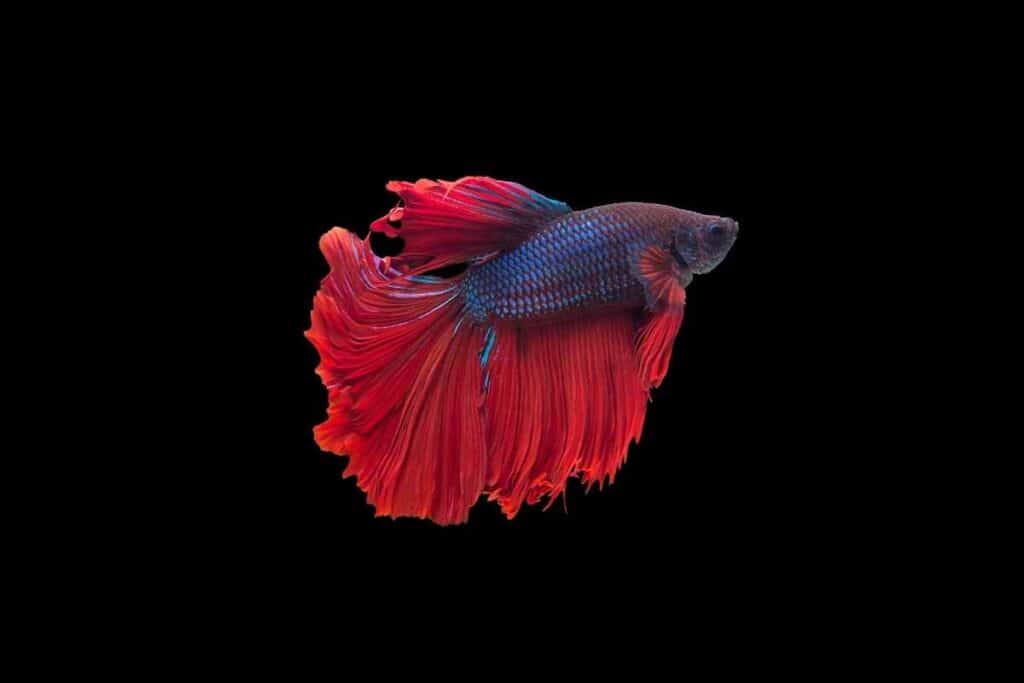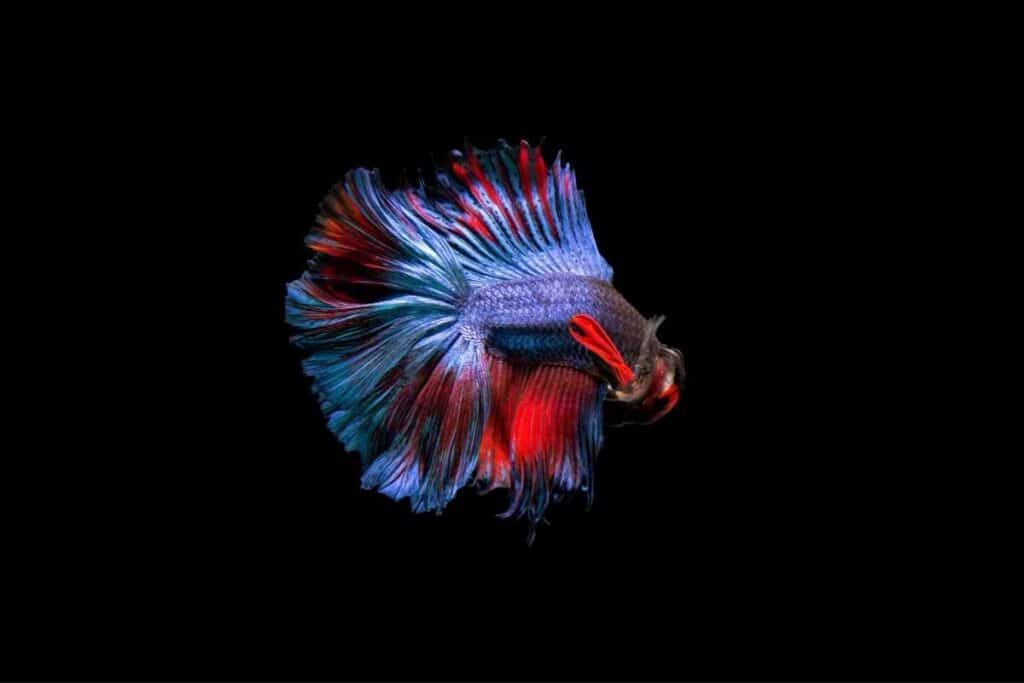Why Is My Red Betta Fish Turning Blue? (Vet Answers!)
When you went to the pet store to get a beta fish it was red and now it is turning blue. There are a few reasons that these fish may change color. Mostly these are due to your fish not living in the correct tank conditions causing them to be stressed. Your fish can be stressed due to many different reasons, but it all comes down to husbandry.
9 Possible Reasons Your Fish can be stressed and changing colors
- Bad water Quality
- Wrong Type of Food
- Improper Water Temperature
- Over watched
- Disease
- Parasites
- Infection
- Improper Lighting
- Picky Fish
- Marble Gene
Most of these issues can easily be corrected just by cleaning and changing the water in the tank to the correct settings. If your fish seems sick reach out to your local fish savvy vet or local fish store for help.
What is husbandry?
Husbandry has to do with what type of environment have you set up for your fish. When keeping fish, it is important to try to replicate their natural habitat by supplying the correct lighting needs, and appropriate water temperature. The closer to replicating every aspect of your fish’s natural environment, the more likely they will thrive.
This means appropriate lighting, specific foods, and sufficient space to grow and move around. These are all the different aspects of fish keeping that makeup husbandry.
1. Bad water quality
Bad water quality is arguably the most common reason fish to be stressed and change colors. Fish are sensitive to changes in PH balance, and chemicals in the water.
Remember, fish eat, swim, pee, and poop all in the same water, so if it is not changed on a regular basis, things can get nasty really fast. If the water quality gets bad enough, your fish will get stressed, stop eating and even change color.
This is because ammonia is one of the chemicals found in fish urine, and when its levels get too high, it will make your fish feel awful. 10 to 15 percent water changes weekly are recommended.
2. Wrong type of food
A very common mistake, especially with beginner fish keepers, is feeding the wrong type of food. There are a lot of options available, so getting confused about what food your fish may need is understandable. Feeding the wrong type of food can cause your fish to be hungry and stressed.

What type of food should you feed?
The best thing you can do is be sure to read the label. Most fish food manufacturers list what species of fish their specific food is made for. Find the one that states it is for a betta. Always be sure to feed for correct species. Food made for saltwater fish may not contain all the sufficient nutrients a betta fish may needs.
Here’s An Example (not and endorsement)
3. Improper water temp
Keeping the water in your tank as close to the temperature your fish would experience in nature is ideal. Most betta fish, seem to do best in a tank that stays between 74- and 80 degrees Fahrenheit.
Is your water too cold?
When the temperature in your fish’s aquarium starts to drop below about 74 degrees Fahrenheit their metabolism also begins to drop. Well, slow down really. Fish do not regulate their internal body temperature as humans do, so they rely on the ambient water temperature to keep them comfortable.
When a fish’s body temperature drops below its optimal operating level, they begin to feel sleepy and sluggish. They will not swim around as much, therefore will really feel the need to eat.
If this problem is not remedied rather quickly, it could lead to starvation. Remember, you never want to change anything quickly in an aquarium, because unlike the ocean, or a lake where there is an abundance of water, your aquariums closed system with a much lower amount of water, will respond much more quickly to change, and your fish may not tolerate it very well.
What if the water temperature is too hot?
Having the temperature in your fish’s aquarium too hot can be just as bad, if not worse than having it too cold. When the water temperature rises above a comfortable temperature for your fish, they may become hyperactive. It may seem better than sluggish or sleepy, like when the water is too cold, but it, in fact, is very dangerous.
When your betta fish become hyperactive, they are also causing themselves to stress, because the hotter the water gets, the more difficult it becomes for your fish to absorb oxygen. This feeling is very stressful and can definitely cause your aquatic companion to stop eating.
4. Being Overwatched
Most betta fish natural habitat is in a places where they may need to keep watch and have a place to hide from larger prey. If they are not provided with an adequate place to hide and feel safe, then your fish may begin to stress. Imagine yourself laying out in the middle of the street trying to go to sleep.
Your fish feels the same way, and just as with humans, fish also need a certain amount of sleep to stay healthy. Providing aquatic caves or dense vegetation is the best way to make your fish feel safe. The longer your fish stay stressed, the more prone to diseases they may become.

5. Disease
It is important to realize that disease is simply the unnatural state that the body is in. So, diseases may not necessarily mean illness, it just means something physically, chemically, or even mentally, is wrong.
But some diseases, such as ich (Ichthyophthirius multifiliis, affect the exterior parts of the body, but can make your fish feel awful. Ich is almost always fatal if left untreated. Another dangerous aspect of ich is its ability to spread. It is incredibly contagious, so it is absolutely imperative, not to flush your fish down the toilet or drain, as you may introduce a deadly disease into a very delicate ecosystem.
6. Parasites
Unfortunately, even though your fish live underwater, they are still susceptible to their own kind of parasites. Monogeneans, parasitic copepods, and even leeches can be carried by fish, and any one of them can make your fish feel bad. Parasites are anything that lives on or inside a host and takes nourishment from it.
When most people think of a parasite, they automatically think of a mite of some sort. Actually, little single-celled organisms called, protozoa, can only be seen through the lens of a microscope but can make your fish feel really sick.
7. Infection
Sometimes when fish have contracted some kind of parasite, they will become more susceptible to infections. Parasites feed of the nourishment of their host, so by doing that, they also make the host immune system weaker, therefore allowing infections to take hold.
Your fish swim in and out of little crevice’s all the time, and sometimes they may get a little scrape or cut from a sharp rock. Usually, this little scrape goes unnoticed, but if a parasite has weakened their immune system, that little scratch can become a serious infection.
Fungal infections are very common in betta fish. Cotton fin (Cotton wool disease), effects the fins and mouth of infected fish. Cotton fin is so named because it grows into a fluffy white mass, on the fins and/or around its mouth. It is usually found where an infection, parasite, or injury was present. It is a fast-growing, and extremely contagious fungus that can kill off an entire aquarium if left untreated.
Bacterial infections are always a worry for fish keepers. Aeromonas is a particularly bad little bacterium, that seems to be more prevalent in freshwater fish. Aeromonas, like most other bacteria, thrives in aquariums where the water quality is very low, and the fish have poor nutrition. These conditions make it very easy for the bacteria to thrive in its host and can eventually lead to death.
Signs of infection include but are not limited to, bulging eyes (exophthalmos), ascites (accumulation of fluid in the abdomen, or ragged unhealthy fins. Weekly water changes, combined with the use of quality RODI (reverse osmosis deionized) water, can significantly lessen the outbreak of most fungus and bacterial infections. Just keeping the water clean can really make a difference in your fish’s appetite.
8. Improper lighting
You might think that since you leave the light in the bedroom on, your fish are getting enough light, right? Wrong. This is especially true with reef aquariums.
Have you noticed how the colors in reef fish are usually much brighter and bolder than the color’s found on freshwater fish?
Some of these colors are not actually pigmented at all, but actually a living bacterium. These bacteria live inside their host but offer beneficial nutrients to it as well. In this way, the bacteria are not considered a parasite, because they supply a benefit to one another.
This relationship is called, Symbiosis. These bacteria though, rely on a specific light spectrum to thrive and be healthy. Using a bulb that does not emit this unique spectrum, can lead to the under developing of these bacteria, and cause your aquatic friends to feel bad. Remember, they need each other to be healthy, so whatever happens to one, will affect the other.
So, it is very important to read labels and even research the fish you are going to keep, in order to ensure your fish are getting appropriate lighting. Most bulb manufacturers will have a list of light spectrums their bulb is capable of emitting.
9. Your fish do not like the food
It may not seem like fish would be picky about what they eat, but they can be stubborn and not eat to the point of starvation if they have to. It has been observed by fish keepers who just wanted to give their fish something different to eat. Mix it up a little.
Their fish will take the food in, only to immediately spit it out again. The fish will literally spit the food out and won’t take another bite.
Overfeeding
You should also avoid overfeeding. Sometimes your fish may not eat, because they’re already full. When you overfeed, you also leave more uneaten food in the tank to decompose, causing poor water conditions, ultimately leading to your fish feeling sick.
Dirty water means unhealthy fish. So, if you’re noticing more detritus (uneaten food) in the tank, then it would be recommended to find food that is more appealing. Find something they’re excited to eat. When you find something, your fish like to eat, you will know immediately.
When fish like what they are eating they usually seem kind of hyperactive, swimming around while they eat, like they would in the wild. Many reef fish are captured in natural reefs and still maintain their wild instincts.
Also, read the label. Make sure that particular food is suitable for their species. Some species require specific nutrients that just a general flake or pellet food may not provide. Some aquatic species like puffer fish, lionfish, and eels, require whole meaty diets.
Chopped squid, whole shrimp, and whole krill are normal foods in these fishes’ diets. A pellet food would not supply the proper amount of protein needed to thrive, and also these species use the shell of these crustaceans to keep their teeth filed down. If their teeth don’t stay ground down, they can overgrow, making it impossible for the fish to eat.
10. Marble Gene
Betta fish can have a marble gene. While this is not common is can cause them to change from red to a marble red to blue color. Many betta breeders will try to breed their fish to have these color changing genes

Final Thoughts
There are all kinds of reasons why your fish betta fish may be turning from red to blue. Most of which can all be summed up into one word, husbandry.
Husbandry affects every aspect of your fish’s life. Water quality, lighting, food, water temperature, all these things make up husbandry, and the imbalance of any one of them can result in your fish becoming stressed and changing colors.
When keeping fish, it is important to maintain a balance between all these things, and the more natural it feels to your fish, the more likely they will grow and be healthy. Therefore, by feeding the appropriate food, and maintaining a healthy environment, you are giving your fish the opportunity to stay healthy. Also, no one wants to look at a dirty tank.

